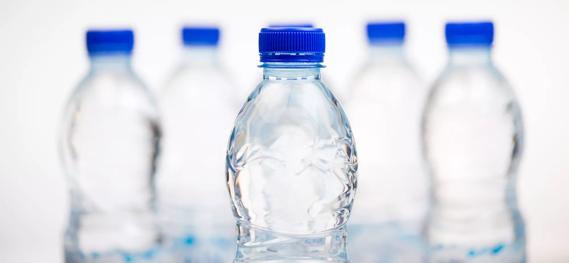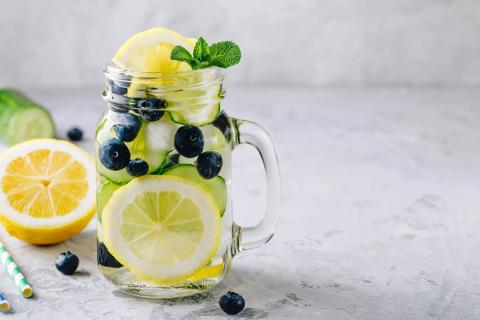Whatever you think it’s doing, your body is already doing on its own

By now, you know staying hydrated by drinking water is key to staying healthy. And with so many companies bottling it up, at some point, you may have wondered “Is alkaline water better for me than regular water?”
Advertisement
Cleveland Clinic is a non-profit academic medical center. Advertising on our site helps support our mission. We do not endorse non-Cleveland Clinic products or services. Policy
Maybe you saw an ad or came across some clever marketing messaging claiming alkaline water can increase your energy, hydrate you better than regular water, prevent digestive issues and disease — or even slow down aging.
“Science does not support these claims,” says registered dietitian Beth Czerwony, RD. “This is a case where a company wants to sell a product, takes regular water and walks it through the process of ionization, maybe slaps a ‘natural’ label on it, charges a high price and, ultimately, takes advantage of the fact people want to believe it’s worth more than what it is.”
Here’s what we know about alkaline water and why it’s probably not doing what you think it’s doing.
First, here’s what you should know about alkaline water. You’ve probably seen this word “alkaline” while walking through the grocery aisles and wondered — how is this different from just plain ol’ bottled water?
Alkaline water is commonly produced by an “ionizer,” a device that changes the chemical composition of water. The idea is that an ionizer changes the pH level of water — which is naturally at a neutral pH of 7. This makes the water more alkaline and less acidic — raising its pH to 8, 9 or higher.
Marketers claim this “less acidic” water offers numerous health benefits, including improving digestion, slowing down the aging process, boosting your body’s mineral content and preventing bone loss. But the U.S. Food and Drug Administration (FDA) has banned the use of any claims of health benefits relating to alkaline water and bone health due to insufficient evidence.
Advertisement
Here are some myths that you may have heard about alkaline — and how they measure up.
The main claim of proponents of alkaline water is that it does a better job of hydrating you than regular water. But when it comes to hydration, what matters most is the amount of wateryou drink, not the type you drink.
Hydration is crucial for health, of course. But because credible research is lacking to back the claim that alkaline water is “more hydrating,” Czerwony recommends sticking with plain water.
“Water is great,” she says. “Just don’t fancify it. Your body is perfectly capable of doing what it needs to adjust your pH levels so you don’t need to buy into these unproven claims.”
As anti-aging goes, this claim about alkaline water is about as real as the fountain of youth.
Yes, staying hydrated in itself is a great way to keep your skin clear and even premature wrinkles at bay, but that doesn’t mean that alkaline water is any better than what you usually put in your reusable water bottle.
Basically, alkaline water doesn’t even compare to what your body can do. Everything that you eat or drink gets digested through the complicated and mighty system that is your stomach. So, the claim that alkaline water improves your digestion or quickens your metabolism doesn’t have a leg to stand on.
This is because once alkaline water hits your stomach, the gastric juices will neutralize it — another example of natural balancing. Not only does this make any resulting benefits from alkaline water unlikely, but they would also be unwanted anyway. That’s because skewing your body’s pH balance too far on the alkaline side can do damage over time — particularly by throwing off the digestive process.
Marketers also claim alkaline water works as an antioxidant to prevent cell damage that leads to disease. “But such claims have not been properly tested in controlled scientific studies,” Czerwony says. “And what’s worse — some run counter to what science tells us about the body.”
It’s true that drinking enough water can play an important part in helping you avoid illnesses. But can alkaline water straight up prevent illnesses? While it’s also true that one of the main pieces of advice you hear when you’re sick is to drink plenty of fluids, alkaline water won’t give you any advantage.
Wouldn’t it be great if you could get energy from just water, instead of a coffee or soda pop? But unless you’re drinking lightly caffeinated sparkling water, alkaline water isn’t going to give you any more energy than regular water.
Advertisement
The truth is, for everything that promoters of alkaline water say it does, we know our body does it better.
“Our bodies are amazing machines,” Czerwony notes. “If there’s an imbalance, there are many ways your body can correct it. If your blood becomes too acidic, for example, you breathe out more carbon dioxide to bring the levels down.”
There have been no empirical studies showing that alkaline water has health benefits. “If and when there are, they’ll be worth discussing,” she adds.
In fact, alkaline water may be doing more to upset your body’s system than help it. According to Czerwony, your body in general prefers a pH that’s closer to neutral (not more alkaline) — and it has its own ways of achieving it. Creating pH extremes in either direction in your system — whether too acidic or too alkaline — can cause health problems. Unless you have certain conditions such as kidney or respiratory disease, your body maintains a healthy pH balance on its own. Alkaline water won’t do you any harm, but it also isn’t a miracle in a bottle, either.
Staying hydrated is — and has been — one of the key things you can do to keep you at your healthiest. You should always drink plenty of water and stay properly hydrated, especially during exercise or hot weather.
Advertisement
But there’s no scientific research backing claims that alkaline water serves as some sort of “super water.” Like many things related to your health, there are no shortcuts. But staying hydrated can be easy, just enjoy at least 64 ounces of regular water daily.
Advertisement

Sign up for our Health Essentials emails for expert guidance on nutrition, fitness, sleep, skin care and more.
Learn more about our editorial process.
Advertisement

Consumption needs vary based on activity, weather, metabolism and other factors

A glass of lemon water in the morning can help with digestion and boost vitamin C levels, and may even help get you into a better routine

Mold and bacteria in your reusable water bottle can cause health issues like infections, respiratory issues and allergic reactions

Sitting in the dry heat may help reduce stress, improve heart health and relieve pain

Adding salt to your water isn’t going to have measurable benefits — but there may be plenty of downsides

Drinking untreated water can have dangerous consequences, like bacterial infections

Although it adds to your hydration, this water may be pushing you over the limit of the daily recommended dosage of caffeine

If you’re trying to drink less soda or fewer sugary drinks, flavored water can be a delicious and healthy alternative

Even small moments of time outdoors can help reduce stress, boost mood and restore a sense of calm

A correct prescription helps your eyes see clearly — but as natural changes occur, you may need stronger or different eyeglasses

Both are medical emergencies, but they are very distinct events with different causes